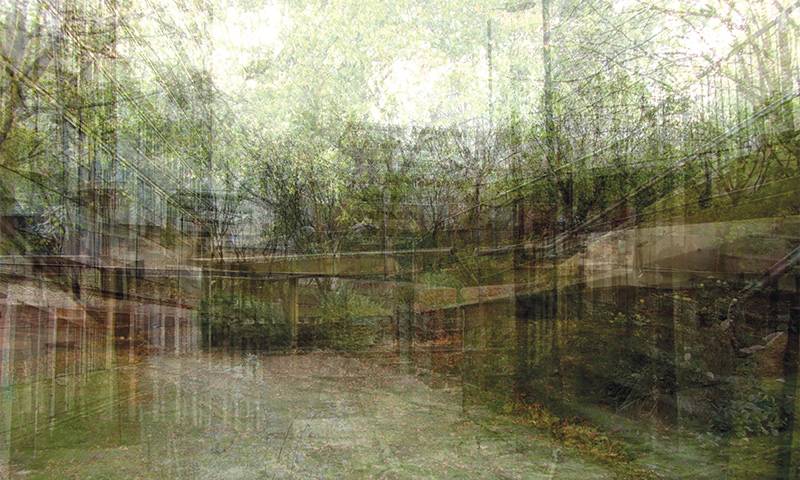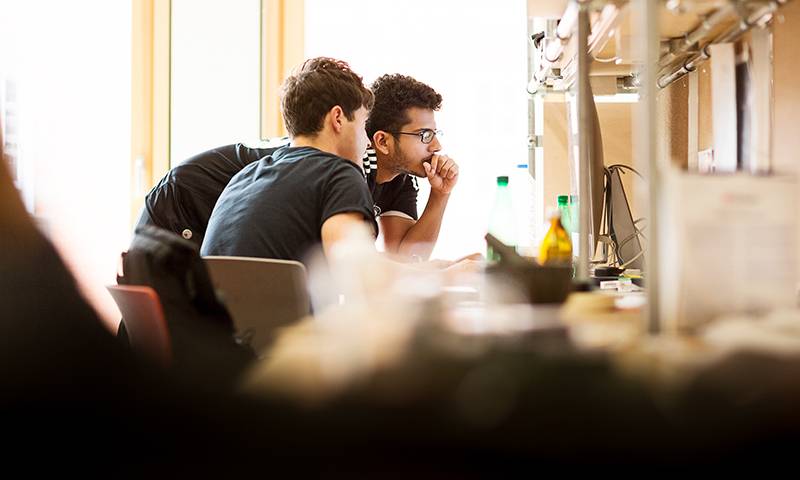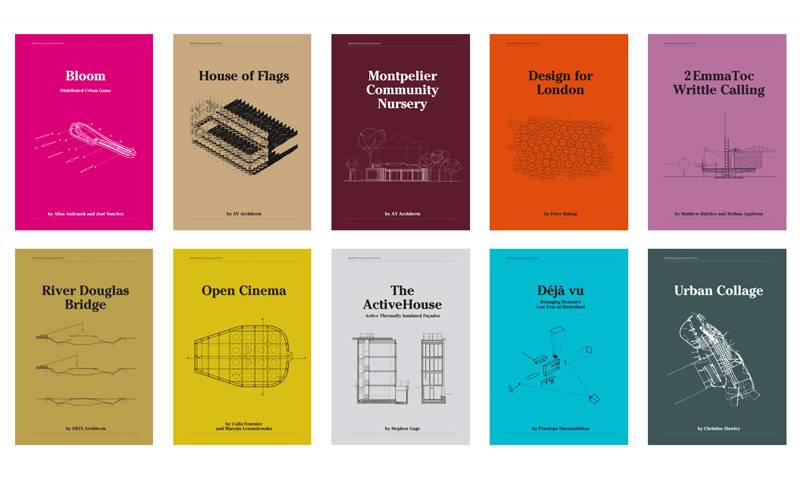
Overview
Architectural Design MPhil/PhD
This stream within Architecture MPhil/PhD encourages the development of architectural research through the combination of designing and writing. Students present a thesis consisting of a project and a text that share a research theme and a productive relationship. The project may be drawn, filmed, built, or make use of whatever media is appropriate.
View the UCL Prospectus page for this programme
Architectural & Urban History & Theory MPhil/PhD
This stream within Architecture MPhil/PhD allows students to conduct an exhaustive, original and creative piece of research into an area of their own selection and definition. The range of research topics undertaken is broad, but most explore the history and theory of architecture and cities between 1800 and the present day.
View the UCL Prospectus page for this programme
Structure
In their first year, students are registered as MPhil candidates, but are then expected to upgrade to PhD status. Full-time students are expected to complete their PhDs in three to four years, whilst part-time students complete theirs in five to seven years.
Architectural Design thesis submissions combine a design project and a text of around 60,000 words. The research for Architectural & Urban History & Theory is normally presented as a text of 100,000 words maximum with illustrative material.
All students have the option of auditing modules from Architectural History MA, led by Professor Peg Rawes.
Students are also encouraged to take advantage of the variety of skills development courses run by the Graduate School UCL and the Language Centre. In particular, students are advised to follow the workshop The Creative Thesis, run in conjunction with the Slade School of Fine Art, which is tailored to practice-led research.
Supervisors
Architectural Design MPhil/PhD and Architectural & Urban History & Theory MPhil/PhD both draw on the full range of the research expertise offered at The Bartlett School of Architecture.
As an MPhil/PhD candidate, you will have two doctoral supervisors: one from the school and a second from another school in The Bartlett or elsewhere in UCL, depending on your research area.
- Current supervisors
Dr Sabina Andron
Graffiti, street art and public art; legal geography and urban property regimes; the right to the city, spatial justice and urban commons; urban semiotics, geosemiotics, surface semiotics; urban visual culture and image theories; deviance, disorder and crime in cities; vandalism, protest and anti-social behaviour; transgressive and subversive practices of urban inhabitation.Professor Peter Bishop
Application of urban design and urban planning theory; incremental urbanism; temporary uses and installations; role of conservation in distorting urban change; role of other stakeholders and political forces outside the design process in the construction of the built environment.
Professor Iain Borden
History of modern architecture; urbanism and urban culture; skateboarding, graffiti and urban arts; public space; experiences of architecture; film, photography and other urban representations; critical theory and cultural studies.Roberto Bottazzi
The aesthetic, spatial and philosophical impact of digital technologies on architecture and urbanism.
Professor Ben Campkin
Histories, theories and practices of urbanism and urbanization. Transdisciplinary urbanism and experimental methods of urban research, publication and public engagement. Urban night spaces, cultures and governance. London’s history and built environment; contemporary urban policy and practice in London. Queer space, architecture and architectural histories; heritage associated with Lesbian, Gay, Bisexual, Trans and Queer populations.Professor Mario Carpo
History of architectural theory and history of cultural technologies, with focus on the early modern period (the Vitruvian tradition and the Italian Renaissance, from Alberti to Vignola) and on contemporary digital design theory (1990 to the present).
Professor Nat Chard
Architecture and indeterminacy; relationship between ideas and technique in architectural representation and manufacture; experimental practices in architecture; developing methods of drawing and making as a means of architectural research.
Professor Marjan Colletti
Digital design and digital theory; experimental building and urban design; innovative CAD/CAM fabrication technologies; neo-baroque and exuberant synthetic and syncretic design techniques.
Professor Marcos Cruz
Innovative environments, utilization of bacteria and algae, computation, bio-technology and synthetic biology.Dr Edward Denison
Histories and theories of modernism and modernity outside ’The West'. Africa, Eastern Europe, Asia, especially China and Chinese encounters with modernity domestically and/or globally. Colonialism, post-colonialism, and globalisation. Cultural heritage and critical approaches to urban heritage. Community engagement/campaigning and neighbourhood planning.
Professor Murray Fraser
Architectural design; design research; architectural history and theory; cultural studies; architecture and globalisation; cross-cultural influences; cultural identity; urbanism.
Professor Stephen Gage
Time-based architecture; architecture that interacts with people and the external environment; architecture and performance.Dr Sam Griffiths
Theories and methods for researching and writing the historical relationship between urban populations and their built environments; the spatial cultures of industrial cities, suburbs and high streets; urban manufacturing; architecture as chronotope in realist fiction and historical writing; space syntax as an interdisciplinary approach to research in the humanities and social sciences.Peter Guillery
London's buildings and topography of the 16th to 21st centuries, especially housing, industrial buildings and vernacular architecture.Dr Sean Hanna
Spatial cognition; mathematical and computational modelling of spatial and social relationships; individual and collective creativity; machine learning and intelligence; complexity and big data.
Dr Penelope Haralambidou
Architectural drawing and making as research methods; art and architecture; Marcel Duchamp; architecture and allegory; theories of perception, memory, imagination and representation in design; visual technologies – historical and contemporary; experimental film and digital projection; exhibition design and curating; book architecture; stage design; and the design of public spaces.
Professor Jonathan Hill
Programme Director
Histories and theories of architectural authorship and design; the formation of the architect; architecture by users and non-architects. Histories and theories of architecture and landscape with regard to their relations with the environment, climate and weather since the eighteenth century.Dr Chris Leung
Prototyping through digital modelling, simulation, fabrication and instrumented testing as a modus operandi for design research; timber construction and sustainable approaches to the design of timber buildings; passive low-energy actuator technologies (phase-transitioning waxes, thermo-bimetals, shape memory alloys) for environmental control in buildings; digital and hybrid digital-analogue control systems for facade systems; solar energy; passive cooling with optically selective radiators; embodied mechanical logic; advanced manufacturing processes e.g. design for multi-material polymer printing.
Professor Yeoryia Manolopoulou
Architectural design and theory; design research methods; architecture and experience; collaborative, aleatoric and performative design; dialogic architecture; place, material practices and building; pedagogic settings; theories of embodied mind, action and environment; the architectural score; practices of drawing; architecture’s intersection with art, anthropology and neuroscience.Dr Clare Melhuish
Anthropology of architecture, the built environment and urban processes; ethnography of architectural practice; urban and architectural visual and material culture; postcolonial urbanism; critical urban heritage; modern(ist) architecture and planning in London; French modern(ist) architecture and planning; Arab cities; Caribbean urbanism; universities and urban regeneration; education spaces and the city; participatory and community-led planning; anthropology of home and domestic space; ethnographic methodologies.Professor Alan Penn
Urban research at the scale between the building and the city; design of complex buildings and their relations to organisations (i.e. hospitals, laboratories and offices); development of computing for architecture; urban pollution dispersal; virtual reality applications for the built environment; simulation of social phenomena and urban growth and change.
Professor Barbara Penner
Tourism; American hotels, resorts, and commercial architecture; gender and space; domesticity; consumerism; bathrooms and infrastructure; inclusive urbanism; appropriate technology.
Professor Sophia Psarra
Architecture narrative and fiction, geometry of architecture and urban space; conceptual order, spatial morphology and spatial experience; the formation of spatial meaning in architecture and symbolic languages across different media; architectural theory; the morphology of cities in relation to processes of industrialisation, de-industrialisation and innovation; spatial design of complex buildings and its relation to society and organisations; computer modelling and visualisation.Dr Caroline Rabourdin
Essay writing as critical and creative practice; spatial theory; phenomenology; art practices; spatial literature; philosophy of language; linguistics; translation studies; comparative literature.
Professor Peg Rawes
Theories of materiality and technology in architecture and spatial arts practices; embodiment, spatial subjectivities and aesthetics; histories and theories of geometry and spatiotemporality in early-modern European and Continental philosophy; social and political theories of ecology; wellbeing.
Professor Jane Rendell
Gender/feminist theory and architecture; art, architecture and urban interventions; critical spatial theory and practice; creative/critical subjectivity and positionality in writing or site-writing; psychoanalysis and space; public space, cultural identity and narrative.Harriet Richardson
Architectural history and heritage; medical buildings; development of hospital planning and design; post-war hospital architecture in Scotland; National Health Service; urban history; Scottish ArchitectureDr Tania Sengupta
Postcolonial and transcultural studies; colonial, post-colonial/contemporary architecture and urban history (non-western worlds, especially South Asia); postcolonial identities in western contexts. For non-western contexts: architectures of governance; provincial identity and rural-urban relationships; spatial cultures of domesticity; material and spatial cultures; global, local and scalar relationships in architecture/ urbanism; everyday spaces and practices.
Professor Bob Sheil
Architecture and design through production, experimental design, prototyping, making, fabrication, craft, innovative technology, digital practice, digital manufacturing, assembly, materials, modelling, transgression from drawing to making, 3D scanning.Professor Mark Smout
Design-based approach to architecture, landscape (urban and rural) and climate change via political, technological and artistic disciplines.Dr Nina Vollenbröker
Mobility; domesticity; the U.S. American West; manuscript diaries; nineteenth-century quilts; photography; histories and spaces of deaf culture; disability and architecture.Dr Robin Wilson
The architectural media (especially the architectural journals of the 20th century); architectural photography; architectural criticism; arts-based and performative methods of spatial research; curatorship and architecture; utopian theory.Dr Fiona Zisch
Cognitive architecture / neuroarchitecture; spatial cognition; cognitive ecologies; neurophilosophy; radical embodiment; embodied knowledge and intuition; cyberfeminism; technology, interaction, performance; movement, choreography.- Other supervisors
Other current doctoral supervisors include:
- Allen Abramson, (UCL Anthropology)
- Matthew Beaumont, (UCL English)
- Nadia Luisa Berthouze, (UCL Computer Science)
- Victor Buchli, (UCL Anthropology)
- Marc-Olivier Coppens, (UCL Chemical Engineering)
- Colin Fournier, (Emeritus Professor of Architecture & Urban Planning)
- Lisa Griffin, (The Bartlett Development Planning Unit)
- Susanne Kuechler, (UCL Anthropology)
- Adrian Lahoud, (Royal College of Art)
- Jerome Lewis, (UCL Anthropology)
- Mark Miodownik, (UCL Mechanical Engineering)
- Sharon Morris, (The Slade School of Fine Art)
- Michal Murawski, (UCL SSEES)
- Ioannis Papakonstantinou, (UCL Electronic and Electrical Engineering)
- Brenda Parker, (UCL Biochemical Engineering)
- Kathryn Riley, (UCL Institute of Education)
- Hugo Spiers, (UCL Cognitive, Perceptual & Brain Sciences)
- Philip Steadman, (UCL Energy Institute)
Events and exhibitions
Architectural Design MPhil/PhD and Architectural & Urban History & Theory MPhil/PhD jointly run a series of events which all students are expected to attend:
Research Conversations
Fortnightly work-in-progress seminars and reviews for new MPhil/PhD students. MPhil students also present more in-depth seminars to meet the criteria needed to upgrade to PhD status.
Research Projects
An annual PhD conference and exhibition with invited critics as respondents, organised by The Bartlett School of Architecture with the Slade School of Fine Art.
Careers
Our MPhil/PhD students develop creative and critical techniques that can be used in researching, designing and writing about any architectural issue, subject or site.
Upon completion of their PhDs, students have gone on to pursue careers in a wide variety of fields, from architectural and design practice to curatorial positions. Students have also progressed into academic roles at both The Bartlett and other higher education establishments, such as:
- The Architectural Association
- Chelsea College of Art and Design, University of the Arts London
- Goldsmiths College, University of London
- Royal Danish Academy of Fine Arts School of Architecture, Copenhagen
- Royal Holloway College, University of London
- University for the Creative Arts
- University of Toronto
- University of Westminster
Contact
Programme Directors: Professor Jonathan Hill and Professor Sophia Psarra
Programme Coordinators: Nina Vollenbröker and Dr Sophie Read
Programme Administrator: Rahil Alipour and Drew Pessoa
 Close
Close



